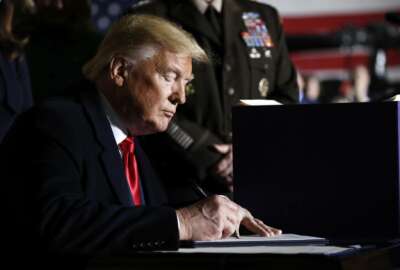
Congress finishes up NDAA, Trump still threatening veto
The president says he wants to veto the bill over old protections for tech companies and renaming military bases.
Congress finished up the 2021 version of the National Defense Authorization Act with just a few weeks to spare. The agreement between House and Senate conferees marks the 60th year in a row that lawmakers will send a defense policy bill to the president’s desk.
The battle over the bill isn’t over yet though. President Donald Trump threatened to veto the legislation if it did not repeal a piece of the 1996 Telecommunications Act, which shields tech companies from liability from content posted by their users.
So far, leaders of the Armed Services Committees stated that a provision like that is completely non-germane to the defense bill and would not entertain the idea.
Trump also said he would veto the bill if it contained provisions that change bases named after Confederate officials. The NDAA holds a more conservative provision requiring the base names change over a three-year time period instead of the House-introduced one-year period.
“National security isn’t simply defined by the planes and ships we buy — but in the values we set for our military and ourselves. We cannot ask today’s young servicewomen and men to defend our nation, while housing and training them and their families on bases honoring those who betrayed our country in order to enslave others,” said House Armed Services Committee Vice Chair Anthony Brown (D-Md.).
The Senate passed its version of the bill by a veto-proof majority of 86-14, the House’s vote was just shy of the two-thirds needed to overturn a veto. However, that could change if Trump actually follows through.
Meanwhile, lawmakers are praising the completion of the bill.
“This agreement is the product of months of hard-fought negotiations,” said House Armed Services Committee Chairman Adam Smith (D-Wash.) and Ranking Member Mac Thornberry (R-Texas) in a joint statement. “This year we have toiled through almost 2,200 provisions to reach compromise on important issues affecting our national security and our military.”
Senate Armed Services Committee Chairman Jim Inhofe (R-Okla.) and Ranking Member Jack Reed (D-R.I.) also expressed their support.
“This year’s NDAA will strengthen our national defense now and for years to come,” the senators wrote in a joint statement. “The conference agreement accelerates implementation of the National Defense Strategy, ensuring we not only have the best planes, ships, and tanks, but that our forces are in the right places, at the right time, with the right capabilities. It pushes back on Chinese aggression by establishing the Pacific Deterrence Initiative, and includes numerous policies to counter Russia and other potential adversaries. The bill directs investments to encourage innovation and develop the groundbreaking technology that will keep our children’s children safe.”
What actually made it into the bill ranges from COVID-19 issues to military pay raises.
Overview
The bill approves more than $731 billion for the military, but does not approve another $8.9 billion that will go to the military in a different bill.
It approves a 3% pay raise for active duty members of the military and increases hazard duty pay from $250 a month to $275 a month.
The bill allows federal employees to carry over an additional 25% of annual leave into 2021 due to coronavirus, and prohibits the defense secretary from reducing the civilian workforce until the Defense Department assesses the impact of the reduction on workload readiness and operational effectiveness.
DoD must update its climate change road map and report on how it will protect its military installations from climate change.
The legislation approves $8.4 billion in military construction for things like childcare development centers and base resiliency efforts.
Cyber
The 2021 NDAA establishes a national cyber director within the executive office of the president. The provision was championed by House Armed Services Emerging Threats Subcommittee Chairman Jim Langevin (D-R.I.).
“We’re going to be treading water on cyber policy for the foreseeable future,” he said in September. “We need someone with policy budgetary authority that would be able to reach across government. They will be the chief advisor to the President on cyber. They will be coordinating the response in the event of a cyber incident, but also doing cyber planning and coming forward to look at those high consequence events that could really cause significant harm to the country. They will also be planning in advance so that we prevent it from happening or have a quick effective response should the bad day happen.”
The bill expands U.S. Cyber Command authority to use resources on more cyber capabilities and it extends the Cyberspace Solarium Commission for another year and a half.
The commission has been advising the government on everything cyber-related from the pandemic to the federal workforce. The NDAA adopts 25 of the recommendations provided by the commission as well.
Artificial intelligence
Congress is backing up DoD’s push for more AI. The NDAA brings up responsibility of the Joint Artificial Intelligence Center (JAIC) to the deputy defense secretary level and gives acquisition authority to the JAIC director.
The NDAA folds in in recommendations from the National Security Commission on Artificial Intelligence like requiring AI training for human resources personnel and encouraging DoD to establish a steering committee on emerging technology.
Science and technology
The bill adds $330 million to DoD’s science and technology budget. Some of that money will go to research on long-term forecasting and sub-seasonal weather patterns.
The creates a working group on directed energy, directs the military services to identify problems that can be better addressed with quantum computing and incentivizes them to work with the private sector.
The bill tells the Pentagon to partner with more minority education institutions and establishes a pay program for positions in DoD labs to assist the military in recruiting and retaining highly qualified acquisition and technology experts.
Personnel and health
The bill slows down the restructuring and realignment of military treatment facilities, something that became a tenuous issue when coronavirus hit.
Now DoD must go through additional requirements before the Defense Health Agency can take over a clinic from a military service.
Congress maintained funding for the Stars and Stripes newspaper.
It funded a pilot program to provide maternity uniforms to pregnant women at no cost, and standardizes the Exceptional Family Member Program across all of the services.
The bill creates a task force on domestic violence and allows sexual harassment and assault victims to make confidential reports outside of the chain of command.
Copyright © 2025 Federal News Network. All rights reserved. This website is not intended for users located within the European Economic Area.
Scott Maucione is a defense reporter for Federal News Network and reports on human capital, workforce and the Defense Department at-large.
Follow @smaucioneWFED






